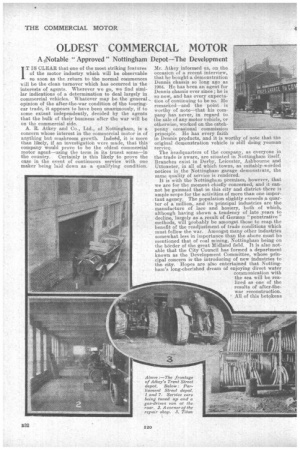OLDEST COMMERcIAL MOTOR
Page 10

If you've noticed an error in this article please click here to report it so we can fix it.
A otable " Approved " Nottingham Depot—The Developm ent
IT IS CLEAR that one of the most striking features of the motor industry which will be observable so soon as the, return to the normal commences will be the clean turnover which has occurred in the interests of agents. Wherever we go, we find similar indications of a determination to deal largely in commercial vehicles. Whatever may be the general– opinion of the after-the-war condition of the touringcar trade, it appears to have been unanimously, if to some extent independently, decided by the agents that the bulk of their business after the war will be on the commercial side.
A. R. Atkey and Co., Ltd., of Nottingham, is a concern whose interest in the commercial motor is of anything but mushroom growth. Inde8d, it is more than likely, if an investigation were made, that this company would prove to be the oldest commercial motor agent—using the term in its truest sense—in the country. Certainly is this likely to prove the ease in the event of continuous service with one maker being laid down as a qualifying condition.
Mr. Atkey informed us, on the occasion of a recent interview, that he bought a demonstration Dennis chassis so long ago as 1904. He has been an agent for Dennis chassis ever since; he is so now, and has every expectation of continuing to be so. lie remarked--and the point is worthy of note—that his company has never, in regard to the sale of any motor vehicle, or otherwise, worked on the catchpenny occasional commission principle. He has every faith in Dennis products, and it is worthy of note that the original demonstration vehicle is still doing yeoman service.
The headquarters of the company, as everyone in. the trade is aware, are situated in Nottingham itself. Branches exist in Derby, Leicester, Ashbourne and Ilttoxeter, in all of which towns, as suitably-worded notices in the Nottingham garage demonstrate, the same quality of service is rendered. It is with the Nottingham premises, however, that we are for the moment chiefly concerned, and it cannot be gainsaid that in this city and district there is ample scope for the activities of more than one important agency. The population slightly exceeds p quarter of a million, and its principal industries are the manufacture of lace and hosiery, both of which, although having shown a tendency of late years to _ decline, largely as a result of German "penetrative" methods will probably be amongst those to reap the benefit Of the readjustment of trade conditions which must follow the war. Amongst many other industries somewhat less in importance than the above must by mentioned that of coal mining, Nottingham being on the border of the great Midland field. It is also notable that the City Council has formed a department known as the Development Committee, whose principal concern is the introducing of new industries to the city. Hopes are also entertained that Nottingham's long-cherished dream of enjoying direct water communication with the sea will be realized as one of the results of after-thewar reconstruction.
• All of this betokens






















